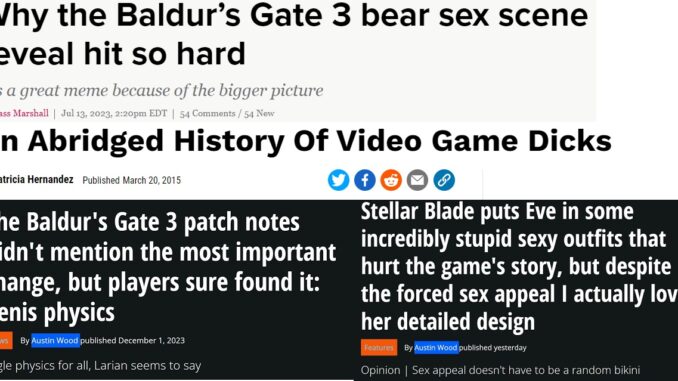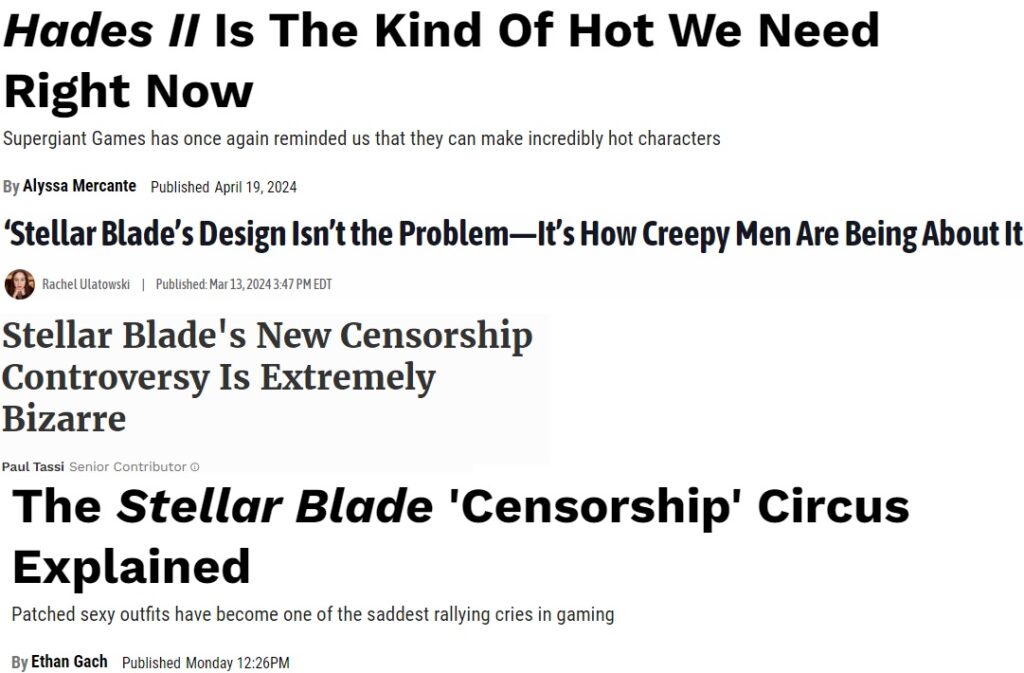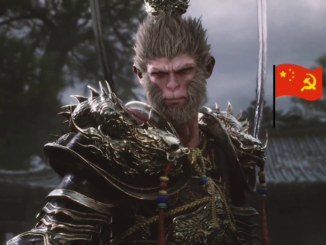
When it comes to the consumer outrage over Stellar Blade, it isn’t about the toning down of sexuality and the game’s alleged “racism.” Those are just the symptoms of the disease itself. That disease is the disingenuous and inconsistent targeting by video game journalists against anything and anyone they deem fair game for their agenda. Which is the real reason why Playstation fans must cancel their Playstation Plus subscriptions because Sony’s forced censorship of Stellar Blade is in capitulation of journalists’ faux-Puritanical demands that resulted in the company, and developer SHIFT UP, violating the rights of consumers.
It has become extremely tiresome seeing video game journalists swinging left and right at anything they don’t seem to like or can get some cheap clicks from. But the problem is exacerbated when they not only talk about certain issues, or demonize certain games and developers who don’t adhere to their nebulous sensibilities, but that they actively go out of their way to punish games and developers who don’t receive their “approval.”
Games such as Six Days In Fallujah and Hatred are just a couple examples of video games that were dogpiled on by the mainstream journalists and their collective groupthink. So it is for Stellar Blade in how it has been demonized by journalists because it “hypersexualized” the main protagonist Eve. Similar to how Bayonetta was treated early on, until the game proved to be popular with gamers and suddenly that same character was now praised for her sexuality instead of demonized for it by the same journalists.
The problem is that the argument of “hypersexualization” and the “male gaze” doesn’t make any sense as it comes from the very same journalists saying that Hades 2 is awesome when there is a female character who is completely naked with her nipples covered by conveniently-placed hair. It is puzzling to witness the hypocritical duality of these people over the same issue: sexuality.
Especially when these journalists are talking about penises and praising bestiality.
Unsurprisingly, one argument being made for this inconsistent stance on female sexuality is because Hades 2 is being propped up as the current DEI darling while Stellar Blade is just a game being developed without DEI consultant involvement (even though the main character is an Asian woman which should check out one of those DEI boxes). What is being conveyed by journalists, when it comes to sexuality in video games, is that they will praise sexually-explicit content if the developer checks off all of the right DEI boxes or is what they like.
Laughably, an explanation from one particular writer over at Kotaku tried to justify the difference saying that “Hades characters’ sexiness is woven into their personalities…In Hades 2, everyone is horny for each other, and thus it feels far less leery and creepy for us as players to be horny for them, too.”
The same writer went on to point out the “differences” between Stellar Blade’s Eve and even Bayonetta,
“She (Eve) is a blank slate, a poseable sex doll, her bountiful chest heaving during idle animations. Unlike Bayonetta, whose sexiness is folded into her personality and fighting style, Eve is just blandly attractive. Eve is the object of desire, not the owner of it.”
The mental gymnastics are amazing here.
From it’s okay to leer after a naked female character because the other characters are horny for her, to character development, and also the genre of the video game itself. There is no consistency or reason to these arguments about why Eve is a problem compared to the other two examples.
Think about it.
When the writer talks about how leering is justified if the other characters are horny for the one you are leering at, how would that argument be applied to a game such as Mass Effect 2? After all, the main protagonist can sleep with a number of characters and let’s not forget Miranda’s ass effect which was edited for the remake. Baldur’s Gate 3 is also celebrated not just for the characters you can sleep with, but especially for being able to sleep with a druid who can turn into a bear.
But the arguments about Eve were also made about the original Bayonetta game, that it was for the male gaze, she is a pin-up model, and more. Until Bayonetta became a commercial success and journalists suddenly declared she was a feminist icon and an example of a sexually-emancipated protagonist who also happened to be part of the LGBTQIA++++ community. So it was now okay for the right kind of people to leer at her. Until Bayonetta 3 showed that she was into men and journalists had a meltdown over it.
What is more, this is the same industry that found Fat Princess to be offensive because the game took a more hilarious approach to the capture-the-flag multiplayer mode. An industry where journalists declared Lara Croft was a male fantasy icon even though she was also a great example of a strong, female character. But nope. It’s about her looks and sexuality.
This hodgepodge of contradictions and exceptions shows the ludicrous extent that journalists are going to when it comes to Stellar Blade and gaming in general. It is a vocal minority who has a majority of influence in the gaming market.
Yet, it is a dangerous minority that once used to fight back against censorship, but have now become the very censors they fought against back in the 1990s and early 2000s. However, unlike the politicians who failed to really cause any damage to the industry, that is not the case for mainstream game journalism.
Video game journalists have arrived at the point where they can threaten Sony, one of the powerhouses in the gaming sector, to violate its own interests and risk litigation from consumers. After all, Stellar Blade gained prominence for advertising itself as being an uncensored romp of fun and a callback to the days when game developers created video games that were about having fun without worrying whether or not people might be “offended” or “left out.”
As stated before, this isn’t about a couple inches of fabric, the hypersexualized character, or the alleged “racism.” That is what the journalists and their lickspittle simps will screech about at every opportunity in an attempt to divert from the real issue at hand. But the truth is, that this is about consumer rights which Sony, by forcing SHIFT UP to censor a game that was being advertised as an uncensored product, is a blatant bait-and-switch for consumers who were falsely advertised to. That the company is selling a physical copy that contains the uncensored version of Stellar Blade that will be censored if consumers download any patches that will overwrite the uncensored version.
When it comes to false advertising, Aliens: Colonial Marines immediately comes to mind as the game showed vertical slices in their demos which was supposed to be the actual gameplay experience. Except, that was a lie and a carefully curated piece of false advertising for a game that failed to live up to what was promised. No Man’s Sky is another example of a game where features were falsely advertised and discovered after release when gamers had paid for the product.
Lawsuits were filed against both games for false advertising but failed to win in the courts. Meanwhile a company like Ubisoft, which has a history of lying to make sales, has skirted any kind of accountability and continues to be prominent in the video game industry. Suffice to say, when it comes to consumer rights, the video game industry has been on the forefront of stripping those away.
Assisted by mainstream journalists.
While it would be nice to see a class action lawsuit filed against Sony, seeing the track record of the courts being in favor of businesses and not consumers, it would only be a means for journalists to get more clicks. Which is why it is imperative for gamers to make Sony pay for this blatant act of false advertising and its acquiescence to the cries of censorship from a hypocritical class of shock-jock, clickbaiting journalists.
Gamers must cancel their PlayStation Plus subscriptions, stop buying Sony merchandise, and utilize social media to tell fellow gamers to do the same.
Because this never stops.
It only gets worse if there are no consequences for these violations and dismissal of consumer rights. It will get to the point where you can’t have sexually appealing female characters in your games anymore. But it won’t stop there. If Sony is allowed to get away with this, then it will escalate. Journalists and their fellow Cancel Pigs, will be emboldened further to force developers and publishers to censor games before release if they don’t approve of a joke in the trailer or a line of dialogue heard in a demo or screech about clothing style or complain that a character is too sexy and “not realistic.”.
It has to be stopped.
Not just by hurting Sony, but by taking away the power and influence from these journalists who write for sites such as Kotaku, Polygon, GameSpot, IGN, etc. These video game news sites have devolved into anti-gamer and anti-consumer rights bastions of woke, agenda-driven content mills to the point that they are the modern-day version of the Jack Thompsons of the 1990s.
The video game industry will never change for the better unless there is a massive shift in mainstream video game journalism or, more importantly, there is real competition in the space that is pro-gamer and pro-consumer.
Author’s Note: Support this site by donating via Paypal or even checking out our merchandise on RedBubble where you can find designs that cater to writers and readers. Money donated and raised goes into paying for this website and equipment.







[…] [ May 1, 2024 ] Stellar Blade’s Controversy Is a Consumer Rights Issue – Why Gamers Must… […]
[…] have become sexist and misogynistic when it comes to female beauty in video games (Stellar Blade is a recent example). Of course, to be fair, I am only judging Naoe by her physical looks and not her character since […]
[…] recent controversy regarding Sony’s PSN requirement for Stellar Blade and Helldivers 2 have reminded PC gamers of the headache that comes with third-party account […]